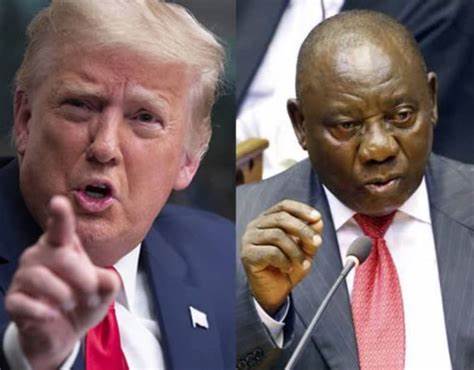by Admin
Feb 8, 2025
The United States President Donald Trump has halted aid to South Africa, citing concerns over a contentious land expropriation law that he claims disregards citizens’ rights and unfairly targets ethnic minority landowners.
In an executive order signed on Friday, President Trump condemned the legislation, calling it a “shocking disregard” for property rights. He asserted that the law, recently signed by South African President Cyril Ramaphosa, enables the government to seize land from Afrikaner landowners without compensation, a move he described as part of a broader pattern of “hateful rhetoric” and policies dismantling equal opportunity.
President Trump further accused the South African government of adopting “aggressive positions” against the United States and its allies, citing Pretoria’s decision to bring genocide charges against Israel at the International Court of Justice (ICJ) and its strengthening of ties with Iran.
“The United States cannot support the government of South Africa’s commission of rights violations in its country or its undermining of United States foreign policy, which poses national security threats to our Nation, our allies, our African partners, and our interests,” Trump stated in the order.
As part of his administration’s response, Trump also pledged to facilitate the resettlement of Afrikaners terming it as “escaping government-sponsored race-based discrimination.”
The dispute over land reform has sparked a public clash between President Trump and President Cyril Ramaphosa. Since Sunday, Trump has repeatedly accused the South African government of “confiscating land” and discriminating against specific groups.
The rift deepened further on Wednesday when U.S. Secretary of State Marc Rubio announced he would not attend the upcoming G20 summit in Johannesburg, citing the land law and other “very bad things” happening in South Africa.
In response, Ramaphosa has defended the legislation, insisting it is a “constitutionally mandated legal process” aimed at ensuring fair and equitable land distribution. He dismissed claims that the law is a tool for mass confiscation, emphasizing its role in addressing historical land inequalities stemming from apartheid.
During a parliamentary address on Thursday, Ramaphosa appeared to push back against Trump’s remarks, declaring that South Africa would not yield to external pressure.
“We will not be deterred. We are a resilient people. We will not be bullied,” he said, calling for national unity in the face of what he described as a rising tide of “narrow interests” and “the decline of common cause.”
With tensions escalating, the freeze on U.S. aid marks a significant shift in Washington’s approach to South Africa, raising questions about the future of diplomatic and economic relations between the two nations.

